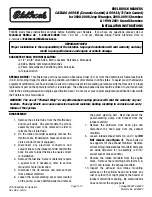
NOTE:
Perchlorate Material – special handling may apply.
See www.dtsc.ca.gov/hazardouswaste/perchlorate
1. If the RKE transmitter is equipped with a screw,
remove the screw. With the RKE ransmitter buttons
facing down, use a flat blade to pry the two halves of
the RKE transmitter apart. Make sure not to damage
the elastomer seal during removal.
2. Remove and replace the battery. When replacing the
battery, match the + sign on the battery to the + sign on
the inside of the battery clip, located on the back cover.
Avoid touching the new battery with your fingers.
Skin oils may cause battery deterioration. If you touch
a battery, clean it with rubbing alcohol.
3. To reassemble the RKE transmitter case, snap the two
halves of the case together. Make sure there is an even
“gap” between the two halves. If equipped, install and
tighten the screw until snug. Test RKE transmitter
operation.
General Information
This device complies with Part 15 of the FCC rules and
RSS 210 of Industry Canada. Operation is subject to the
following conditions:
•
This device may not cause harmful interference.
•
This device must accept any interference received, includ-
ing interference that may cause undesired operation.
NOTE:
Changes or modifications not expressly approved
by the party responsible for compliance could void the
user’s authority to operate the equipment.
If your RKE transmitter fails to operate from a normal
distance, check for these two conditions:
1. A weak battery in the transmitter. The expected life of
the battery is a minimum of three years.
28
THINGS TO KNOW BEFORE STARTING YOUR VEHICLE
Summary of Contents for 2014 Challenger SRT
Page 1: ...O W N E R S M A N U A L 2 0 1 4 Challenger SRT ...
Page 4: ......
Page 7: ...1 INTRODUCTION 5 ...
Page 10: ......
Page 100: ......
Page 136: ...134 UNDERSTANDING THE FEATURES OF YOUR VEHICLE ...
Page 137: ...3 UNDERSTANDING THE FEATURES OF YOUR VEHICLE 135 ...
Page 138: ...136 UNDERSTANDING THE FEATURES OF YOUR VEHICLE ...
Page 204: ......
Page 209: ...INSTRUMENT CLUSTER 4 UNDERSTANDING YOUR INSTRUMENT PANEL 207 ...
Page 281: ...4 UNDERSTANDING YOUR INSTRUMENT PANEL 279 ...
Page 352: ...350 STARTING AND OPERATING ...
Page 384: ......
Page 497: ...INDEX 10 ...
















































